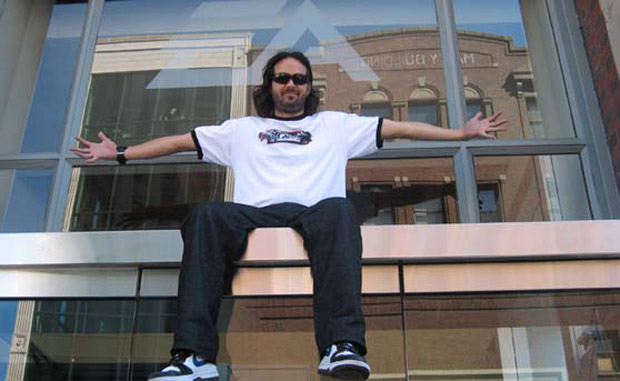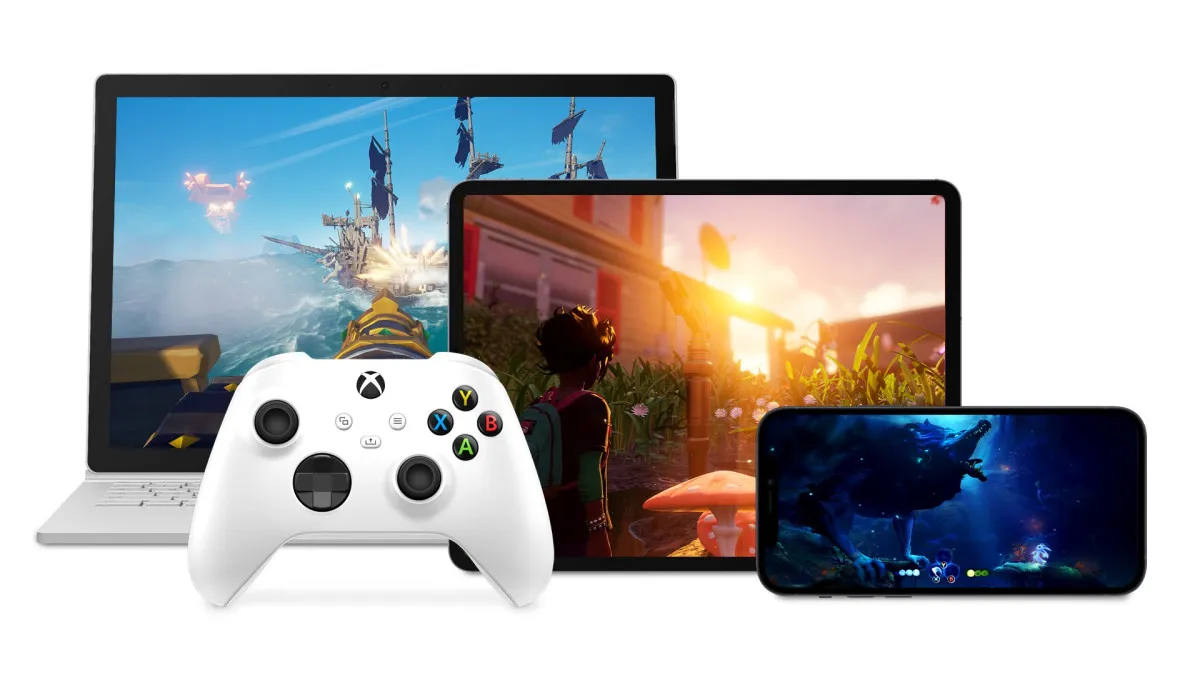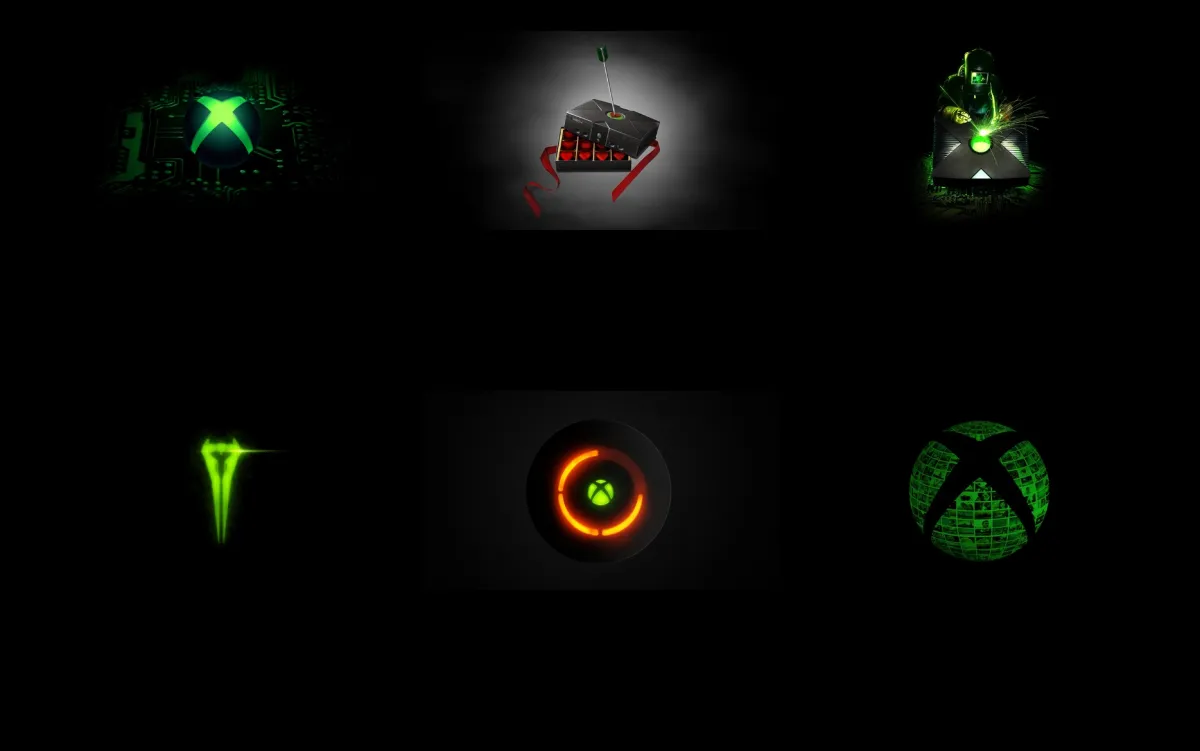Media celebrities are a double-edged sword. On the one hand the people tend to either love them or hate them and on the other hand they do provide an iconic personal image for the industry to the outside world, for better or worse.
At gamescom 2010, I got the chance to talk to Kudo Tsunoda during what was supposed to be an interview about Kinect. Being the project lead of Kinect at Microsoft, it was pretty hard to get anything out of him that wasn’t your typical “why Kinect is great” PR talk. Yet the more questions I asked him, the more I got a shimmer of a hint of the man behind the face of “Kudo Tsunoda, that guy with the sunglasses”.
Rather than rehashing known Kinect information, it’s more interesting to look at Kudo as a human being. Especially because he is a pretty polarizing character in the game industry when it comes to gamers’ opinions about him. Or wait, polarizing means someone has to have both haters and fans right? Either way, here it is.
You as a brand
If there is anything we all know about Kudo, it is that he is an instantly recognizable character. The sunglasses, which he apparently wears because of a light sensitivity, the urban outfits, knowing what the bottom of an avatar’s shoe looks like. We all know him by now. At the GDC Europe keynote, David Cage talked about how he himself focused on the name David Cage as a brand during the Heavy Rain development and promotion. To put it bluntly, consider the difference between “Heavy Rain, a game published by Sony Computer Entertainment” and “Heavy Rain, a game by David Cage”. He talked at lengths about how it was not about ego or some hedonistic rationale, but that he did so in order to free himself from restrictions of IP and publisher rights and to keep more leverage when maintaining creative control.
Because if people would end up loving Heavy Rain, then they would be more likely to be interested in the next David Cage game. While if you just push your promotion as your game being “that Heavy Rain game”, only a small minority in the gamer consumer base will even know that your next game is from the same guy whose creative vision drove the development of Heavy Rain. If your publisher is continuously complains about required changes to what you think is the way the game is supposed to be, then you are in a much better position to keep creative control if everyone already knows who you are; the game’s sales would suffer if you left the development process.

He urged developers to promote themselves more with that type of self-branding in the future. Not so much to pimp themselves as being Mr. Developer Esquire for fame’s sake, but only to keep their creative control and not to be shackled by their publishers whims and fears. Kudo seems to have either learned that years before David Cage did, or it is just who he is. To be fair, Kudo Tsunoda is not as much a developer of the “creative” type as David Cage is. While they both have a lot of ideas about how to do things this way or that, their background and focus is completely different. There is also a difference in how you portray yourself. Yet in a way they are similar in the way they can currently be considered gaming celebrities.
Talking to Kudo, there seems to be a giant wall of well-prepared PR talk between the private person Kudo and whoever he is talking to in an interview. He is actually so good at it that it’s scary. When you work with PR and other types of external communication, it’s easy to create a form of a secondary persona that you portray yourself as to the outside world. Some people are who they seem to be and some people act like it. Using such a secondary persona is also safe in one way, because you keep a large distance between the masses of people you communicate with and you yourself as a private person. In another way though, there is always a risk of blurring the lines between the real you and the portrayed you as you keep using that method. Until you end up with a mix of who you once were and who you tried to be.
Fight Night PR
As Kudo moved from the closed-down studio EA Chicago (Def Jam: Icon, Fight Night Round 3), which he formed from the NuFX studio and where he was executive producer, to working as creative director on Gears of War 2 and finally to the Kinect project. I asked him if he had any specific goals he wanted to achieve while working on Kinect, a pretty standard and easy question. The response I got was quite interesting below the surface.

Kudo:
“I think it’s interesting, like, and I would like to be able to tell you that this was something that I planned out like from the very beginning, but it’s not really like that. It’s just something that as I look back on all the games that I’ve worked on that’s just an interesting thread that’s existed throughout all the games is you know I’ve always been very interested in trying to get more gesture-based controls as a way of making the experience more immersive. Because like the more that it’s like you remove the controller as an abstraction layer, the more you feel like part of the experience right?
And you know I used to work on a boxing game called Fight Night, and with Fight Night we wanted to build very gesture-based controls and so if you wanted to throw a punch, you had take the 360 analog stick and to throw a punch, you had to move out to the right like this and arc it forward, so you move the analog out and arc it forward and that’s a very rudimentary way of doing gesture-based controls on a controller. And it’s so frustrating as a creative person, when you work kind of outside of Microsoft, that you end up getting something like a controller and then you have to take your creativity and put it into the controller to figure out how to make it work.
But the great thing about coming to Microsoft was: you can partner with people on the hardware team, partner with people on the platform team, and really get a creative, iterative cycle going, of how can we really make an immersive, eh you know, system where you’re using your body and using your voice to really put people into the experience. And I think whether it was, you know, Fight Night or whether it was Def Jam: Icon or any game that I worked on before, those were things we tried to do through a controller but that we can now really do in a much better way with Kinect.”

Phew, did you get all that? There are a couple of ways to look at such an answer. At the surface, this is just someone using buzz words (experience, immersion, gesture-based controls) and personal history to mix it into a structured answer that results into “Kinect is great”. If we look beyond that though, Kudo was someone who worked on what we now know as the “Flick-It” system for Fight Night Round 3. I truly believe he had no plan to make that kind of gesture mirroring control scheme into something that he wanted to build upon as his life’s work. It feels more likely that he came up with an idea and that he seemed like a logical fit to work on Kinect to expand upon that idea without a controller being required.
The speed and fluidity of his answer either means he was completely prepared for such a question, or that he is so well trained in framing answers out of talking points that he can do a structured and quick answer on the fly. And it isn’t even beyond the realm of imagination that it is the latter, as he graduated from George Washington University with a degree in Philosophy in 1992 after all. I know some of you more tech-oriented readers might scoff as such a degree, but philosophy does teach you to analyze and think in a structured way that is at least a better foundation for creative thought and structured language skills than studying the processing cost of using real-time on megatextures.

Every question I asked was eventually turned into an answer about how Kinect was great in a similar way. I’ve summarized some of them to illustrate the structure of his answers:
Q: While working on Kinect, did you find some things that you think would create a new kind of vision for what you want to see down the line?
A: There is interesting stuff when developing for Kinect. Kinectimals is great because it lets you build a relationship to a virtual character (i.e., human media interaction). Kinect is great because we can see more of these things going forward.
Q: In a past interview you’ve said that you like to immerse developers into a “method school of acting” for developers. How do you do that with Kinect?
A: Full body control of the character. In arcades you like to play a motorcycle game that makes you feel like you are riding a motorcycle. Kinect is great because you see what you are doing on screen. Kinect is basically an arcade in your living room. Also, immersion.
Q: What about XBLA?
A: XBLA for sure, not something we’re talking about now. Xbox does a good job of making technology initiatives available to smaller developers and indie developers and you’ll see more news when we get closer to launch. (note: new Kinect software tech keeps getting integrated into the XDK which is available to any Official Xbox Developer)
Q: Is there a protection layer in case you have Kinect take naked pictures?
A: Yeah we have it go up to a website first, so that you know, people can go and we see what content can be shared and what can’t so.
Q: Oh, it gets rated first?
A: We’re not too much talking about exactly how that works yet, but obviously privacy controls are very important. Parental controls are already on xbox, people will be able to share the content they want to share and not what shouldn’t be shared.
Scratching the surface
So here we have someone who knows very well how to work PR in a long answer that mostly makes sense when you hear it live. That doesn’t tell us much about a person other than that he or she is just really good at friendly, down to earth, PR talk while staying on message. But when I asked about how he has said that he likes to be inspired by the city he lives in when he works on a game and if that is still true now, I didn’t get the answer I expected. After growing up in New York and then living in Chicago for a while, Redmond, WA and the area around it did not seem like very inspiring locales for someone like him.

Kudo talked about how he has a lot more family in the Seattle area and how he liked that. To be able to have his family come over and playing games. It actually sounded a bit to me as if having people around you who don’t judge you, see you as their boss or compete with you felt like a good thing to him too. He went on to talk about how he tried to get his family involved with playing Xbox (360) instead of playing games like Boggle and Monopoly on family game nights, but they were always like “Oh hey yeah, this is really fun Kudo, I’m glad you work on this stuff. Oh we’re gonna go back and play some more monopoly now”.
He mentioned how his family would end up with the camera pointed towards the ground all the time too, which sounded all too familiar. Without the controller, he thinks, it would’ve been much better. He ended his answer by going back to Kinect again (of course) and saying “mostly the inspiration was that I was sick of playing Monopoly and just wanted to get my family to play more Xbox, that led a lot to our initial thinking about Kinect”.
I try that too but only to get my friends and family to unlock co-op achievements. To each his own. What struck me the most was how even though he spun the answer towards “Kinect is great”, it made me kind of empathize with him. Here’s a guy in his late 30s or early 40s who acts to the outside media world as if he’s a creative Peter Pan who doesn’t want to grow up. But at the same time he still came across as a loving family person at heart, even though he doesn’t seem to act like the ideal son in law type in the media. Mid-life crisis? I don’t know.

It’s not a lake… it’s an ocean
So is Kudo just acting out a secondary persona for outside viewing only, or not? I find that hard to say. While Cliff Bleszinsky is a more public celebrity where it feels like he acts the way he is and David Cage is a man with a plan who acts it out consistently according to what he thinks is best, Kudo felt like he is one of two things. Either he is someone who is stuck between himself, his job and the PR he has to do, or he is just who he is across all those roles. THe main impression I got from our interview was that he probably just is the same person he acts like. But then with a slight sensation of talking to one of those movie celebs who surround themselves by friends and fans, but who kind of get stuck between what they think they should be like and how they really are.
In the end, Kudo Tsunoda came across as a genuinely nice ‘live in the moment’ guy with a lack of direction of what he really wants in life for himself. And maybe that is exactly the qualities you want in a creative director: someone who can think of crazy things in ways more structured personalities tend to be worse at doing. But If I had one piece of advice to give him, it would be: “Dude, take a break after Kinect launches to reflect, fill your basement with arcade cabinets, buy an expensive car and settle down with a nice and caring girl”.
Gaming celebrities are here now and they are here to stay, whether we want them or not. Though there are too few now to call someone “kind of like X” like in the movie industry, there is only going to be more of them in the future as gaming becomes an ever more legitimate entertainment industry in the wider public’s eye. What is going to be the most interesting to us is how they will profile themselves and how they will deal with separating their celebrity statues from their private life. Well, that and the antics they provide us with to turn into .gif images and youtube mash-ups.
David Cage image from GDC Europe flickr




